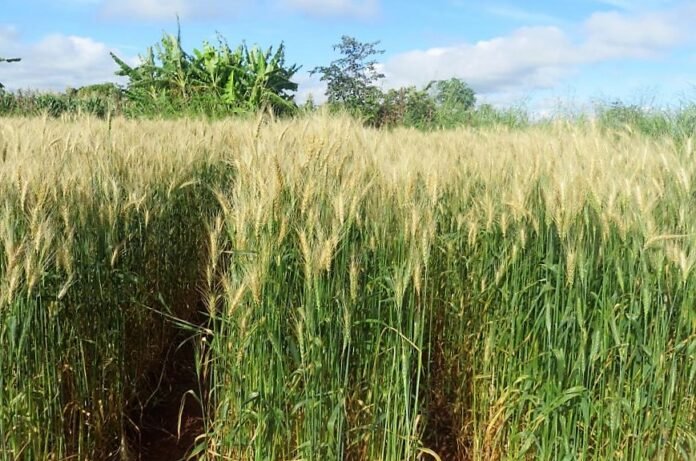In an increasingly interconnected world, the repercussions of climate change, globalization, and armed conflicts are far-reaching, exacerbating the swift spread of plant pandemics, and placing the sustenance of billions in a precarious balance, warn scientists.
A Call to Arms: Unprecedented Wheat Fungus Spread Demands Cross-Border Collaboration
An insidious fungus, infecting wheat crops, has traversed the globe with alarming speed, prompting experts to advocate for a concerted, international effort in genetic surveillance of agricultural species to minimize potential devastation.
First rearing its head in Brazil circa 1985, the wheat blast fungus has since proliferated in neighboring nations. Alarmingly, more recent outbreaks have surfaced in Bangladesh and Zambia.
In 2016, the fungus laid waste to roughly 15,000 hectares in Bangladesh, compromising upwards of 16% of the nation’s cultivated wheat expanse and decimating yields by up to 100%. Following its appearance in Zambia two years later, intermittent outbreaks of varying intensity have persisted.
With apprehension mounting, scientists speculate that the fungus may infiltrate further countries via infected seeds or windborne spores.
Bracing for a Worldwide Plant Disease Onslaught
With wheat blast having infiltrated 21 Bangladeshi districts, trepidation grows that China and India—the planet’s foremost wheat-producing giants—could be next in line.
An investigation spearheaded by University College London in conjunction with the Sainsbury Laboratory in East Anglia established that the fungus afflicting Bangladesh and Zambia—Magnaporthe oryzae—shares genetic roots with the South American variant, although pinpointing its exact provenance remains elusive.
Emphasizing the unparalleled dissemination of wheat blast across three continents housing climates amenable to the fungus, researchers argue that global food security hangs in the balance, a situation further aggravated by climate change and persistent armed conflicts within key agricultural regions.
Heeding lessons from the Covid-19 pandemic, the scientists propose implementing analogous genetic monitoring techniques to track the fungus’ spread and mutation patterns.
Published in PLOS Biology, the research involved the scrutiny of wheat blast’s genetic makeup via 84 simultaneous PCR tests.
The team unearthed that the Rmg8 gene is impervious to the fungus, while the disease is susceptible to strobilurin fungicides. They underscored that genomic surveillance, particularly in nations abutting affected regions, constitutes the most promising strategy for curbing fungal dissemination.
A Forward-Thinking Stance on Plant Disease Management
According to Professor Nick Talbot of the Sainsbury Laboratory, “Only by really understanding the enemy and understanding the pathogens that cause these diseases will we be able to really pre-emptively control them.”
Talbot highlights the imperative to gear up for the worldwide diffusion of plant diseases, fueled by climate change and globalization, and adopt a proactive rather than reactive stance in forecasting and preparing for the migration of these afflictions.
Further inquiry is crucial in ascertaining the potential evolution of plant diseases, such as the wheat blast fungus, to resist pesticides and fungicides, and to delve into alternative solutions beyond chemical application.
Echoing this sentiment, Professor Sophien Kamoun of the Sainsbury Laboratory asserted, “This project builds on the paradigm—best illustrated by the Covid-19 pandemic—that genomic surveillance adds a unique dimension to the coordinated response to infectious disease outbreaks. We need to remain vigilant and continue genomics surveillance of wheat blast in Africa and Asia to identify variants of concern as soon as they emerge.”
The Importance of International Cooperation and Adaptation
The rapid and widespread propagation of plant pandemics, as epitomized by the wheat blast fungus, underscores the urgency for international cooperation, effective communication, and resource sharing among nations. Such collaboration will be pivotal in addressing the global challenge posed by plant diseases and safeguarding the world’s food supply.
As climate change continues to exacerbate environmental conditions, it is vital for countries to adapt their agricultural practices accordingly. This may involve investing in resilient crop varieties, implementing sustainable farming methods, and utilizing advanced technology to monitor, predict, and respond to the threats posed by plant diseases.
Empowering Farmers and Raising Awareness
Equipping farmers with the knowledge and tools to identify, prevent, and manage plant diseases is another essential component in mitigating the risks associated with global plant pandemics. By providing education, resources, and support to farmers, countries can empower local communities to take charge of their food production and build resilience against future threats.
Raising public awareness about the impact of plant diseases on food security is equally important, as it encourages consumers to make informed decisions and support policies that promote sustainable agriculture and global collaboration.
Looking Ahead: The Role of Science and Technology in Combating Plant Pandemics
As we confront the looming threat of global plant pandemics, the role of science and technology becomes increasingly crucial. Innovative research in fields such as genomics, biotechnology, and artificial intelligence can help us better understand the dynamics of plant diseases, develop effective prevention and control strategies, and monitor their spread in real-time.
By fostering interdisciplinary collaboration among scientists, policymakers, and agricultural stakeholders, we can harness the power of cutting-edge research and technological advancements to ensure a secure and sustainable food future for all.
In conclusion, the challenges posed by global plant pandemics demand a comprehensive, proactive, and collaborative approach. By working together across borders and disciplines, we can protect our vital food supply, preserve the environment, and promote the well-being of billions around the world.











